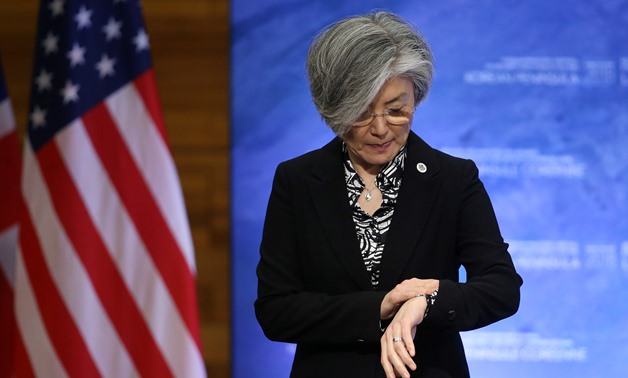
South Korean Minister of Foreign Affairs Kang Kyung-wha gestures during the Foreign Ministers’ Meeting on Security and Stability on the Korean Peninsula in Vancouver, British Columbia, Canada January 16, 2018. REUTERS/Ben Nelms
DAVOS, Switzerland - 25 January 2018: South Korea has prepared "all contingency scenarios" in case North Korea stages another weapons test even as the two countries hold a series of talks and mutual visits around next month's Winter Olympics, South Korea's foreign minister said.
"We go into these discussions with a clear understanding of what might be possible", Kang Kyung-wha told Reuters in an interview on the sidelines of the World Economic Forum in Davos, Switzerland.
"Another provocation is always a possibility. So we approach these talks with all contingency scenarios in mind and are prepared to deal with whatever might happen, but overall it's a good thing".
Kang, who is in Davos to discuss recent progress in inter-Korean talks and boost awareness of the Olympics, did not discuss details of the scenarios that South Korea was prepared for.
After their first formal talks in more than two years this month, officials from the two Koreas are making visits to each other to facilitate the North's participation in the Olympics to be held in the South's alpine resort town of Pyeongchang.
Pyongyang is waging a publicity campaign around its attendance, calling on Thursday for "all Koreans at home and abroad" to promote inter-Korean cooperation.
Kim Jong Un's regime has also set a new anniversary to mark the formation of its military on Feb. 8 - the day before the start of the Games - and analysts say it may mark it with a large military parade.
U.S. Vice President Mike Pence, who will represent the United States at the Olympics, said on Tuesday he would seek to counter what he called an effort by North Korea to "hijack" the Games with a propaganda campaign.
Seoul has rejected that criticism, saying the Olympics will help defuse tensions over Pyongyang's nuclear and missile programmes.
"This is an opportunity for engagement and a peaceful engagement around the Olympic Games, and we just need to make the best of it," Kang said in the interview, which took place on Wednesday.
Last year, North Korea conducted dozens of missile launches and its sixth and largest nuclear test in defiance of U.N. Security Council resolutions as it raced towards its goal of developing a nuclear-armed missile capable of reaching the United States.
Another test or similar provocation "would be not acceptable", she said. "And further provocations will only lead to further pressure and sanctions".
HOPES FOR FURTHER DIALOGUE
With the North joining the Games, South Korea's liberal President Moon Jae-in tackled his immediate goal of curbing tensions and reopening cross-border dialogue.
But analysts say turning the thaw into longer-term detente will be far more daunting, as the North rejected to discuss its nuclear weapons programme with the South during earlier talks.
"The period of non-engagement with North Korea has been too long," Kang said.
"There is hope and there is expectation that this will lead to further discussions of issues between South and North Korea and that dialogue will create the momentum for dialogue on the North Korean nuclear issue as well."
In an apparent bid to court the North, which calls joint South Korea-U.S. military exercises a "rehearsal for war", Seoul had proposed a delay in the drills during the Olympics.
The proposal was based on the "spirit of the Olympic Games", Kang said, but declined to elaborate on whether the South would resume the drills after the event.
"We're on the same page on all fronts (with the United States)", she said. "So we will see how the next two months will unfold."
Kang said China and Russia can "do more" to improve the enforcement of the U.N. Security Council (UNSC) sanctions against North Korea in areas such as the interdiction of ships suspected of conducting illegal transfers of oil and coal at sea.
The U.S. Treasury on Wednesday newly blacklisted nine entities, 16 people and six North Korean vessels it accused of helping the North's weapons programmes.
"This is now mandatory by the latest UNSC resolution, if you have information that illicit transfers are being done ship-to-ship, that's a clear violation and you have to stop that," Kang said.
"China and Russia are members of the Security Council - they have in fact the primary responsibility to see their decisions on the sanctions are implemented."


Comments
Leave a Comment